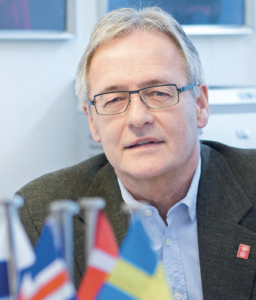Member of the Steering Committee EASME (EU)
Janusz Kahl, CEO in South Poland Cleantech Cluster (SPCleantech, www.spcleantech.com ) has been chosen by the European Commission as member of the Steering Committee for the project „Skills for smart industrial specialization and digital transformation” for Executive Agency for Small and Medium-sized Enterprises, EASME acting under the powers delegated by the European Commission EASME / DG GROW, which has been granted to PriceWaterhouseCoopers (PwC) in Luxembourg.
EASME is the largest EU agency managing, among others, EU funds from the HORIZON 2020, COSME and ERASMUS+ programs. Under the project, a system of support for member states, regions, cities, organizations, clusters and companies will be created in the new financial perspective from 2021-2027. The aim of the program is to strengthen the EU’s competitiveness in relation to the USA, Japan, South Korea, Israel and others.
The ultimate goal is to help cities, regions and Member States in designing and implementing ambitious skills policies for smart industrial specialization and digital transformation strategies.
The Steering Committee is composed of 5 independent experts renowned in the field from academia, industry, associations, etc. representing different EU countries.
Members of the Steering Committee:
John Higgins, Director General of DIGITALEUROPE (http://www.digitaleurope.org/Welcome )
Elif Köksal-Oudot, Economist at OECD Directorate for Science, Technology and Innovation ( http://www.oecd.org/sti/)
Bruno Lanvin, Executive Director of INSEAD’s Global Indices (https://www.insead.edu/global-indices )
Janusz Kahl, South Poland Cleantech Cluster (http://spcleantech.com)
Leif Edvinsson, Universal Networking Intellectual Capital (http://www.checkdirector.co.uk/director/leif-edvinsson/ )
Members of the Steering Committee will:
- monitor work and perform reviews of reports developed by PwC
- meet in Brussels with EASME and the European Commission to review progress and discuss the preparation of periodic reports, which should be approved by the Steering Committee
- participate in teleconferences
- provide advice and guidance during work
The main results expected are the following:
- Better understanding how strategies, policies and initiatives on high-tech and T-shaped skills could be designed and efficiently implemented at all levels (cities, regions, Member States and EU levels);
- Developing a common vision and improving framework conditions;
- Helping cities, regions and Member States in designing and implementing ambitious skills policies for smart industrial specialization and digital transformation;
- Promoting STEM discipline and high-tech T-shaped skills;
- Facilitating the identification, the promotion and the uptake of best practices;
- Delivering concrete solutions, including the creation of a toolbox.
This service contract should contribute to developing a common vision and supporting actions on skills for smart industrial specialization and digital transformation with a view to increasing the capacity of industry, social partners, education and training organizations and policy makers at all levels to shape the workforce transformation successfully in Europe.
PwC will also be responsible for setting-up an informal group of at least 100 of the most relevant key stakeholders.
This group should cover at least 10 EU Member States with a good representativeness and geographical balance. This group will be consulted regularly and experts from this group will be invited to expert workshops on an ad-hoc basis (with at least 60 % new experts at each workshop).
The group of key stakeholders will be drawn from representatives of (the list is indicative and not exhaustive):
- Public authorities at local, regional and national levels;
- Public or private organizations in charge of smart industrial specialization or digital transformation initiatives at all levels;
- Industrial clusters;
- Public-private partnerships,
- Industry, unions and academia (universities, business schools and training providers);
- Recruitment and human resources professionals;
- Public or private education or training providers;
- Organizations or networks representing industry, small and medium-sized enterprises, sectoral organizations, higher education and training providers;
- Chambers of commerce, of industry, of labour etc.;
- Public training and higher education authorities;
- Economic development agencies, statistical bodies and research institutes etc.;
- Organizations providing career guidance, professional counseling, information services and employment services, etc.
The work should mobilize a large number of stakeholders and Member States contributing to the success of the EU high-tech skills strategy and efforts to facilitate the uptake of digital and key enabling technologies by European enterprises, especially SMEs and start-ups. The results should inform policy-makers and business and social leaders regarding more effective policies, partnerships, and initiatives on skills for smart industrial specialization and digital transformation strategies, as well as, to increase the high-tech talent pool, employment and the competitiveness of the European economy.



